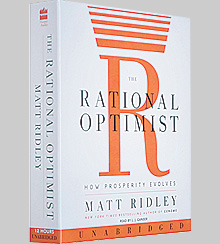Continual Prosperity
A review of The Rational Optimist, by Matt Ridley.
(originally published by Booz & Company)The Rational Optimist: How Prosperity Evolves
By Matt Ridley
HarperCollins, 2010
In The Rational Optimist, Matt Ridley makes a lengthy, breezy, almost Panglossian case for what he calls rational optimism regarding the future of the human race. He is impatient with the doomsayers, whom he calls apocaholics, and is unable to explain their widespread appeal. He has considered the evidence dispassionately, he claims, and concludes that our future is bright, even if our prospects dim on occasion.
Ridley’s basic thesis is sensible enough. Economic prosperity derives not from natural resources, but from trade and the division of labor, and the specialization and innovation that they breed. This catallaxy, as he terms it (borrowing a word coined by Austrian economist Friedrich Hayek to describe economic exchange), is a bottom-up, self-amplifying process that has been operating with increasing vigor ever since the Stone Age. Innovation is limitless, and top-down attempts to control or even suppress it are misguided and counterproductive.
Ridley bolsters his conclusions with evidence drawn from the last 50,000 years, showing that not only have we never had it so good, but our prospects can only get better. In his view, climate change is an over-hyped bogeyman — locally disruptive, but globally beneficial — and the conditions of people in economically underdeveloped nations will generally improve as they are saved by their “entrepreneurial vitality.”
This case for global optimism is quite compelling, so what’s not to like? One problem is that people don’t live their lives at this coarse-grained scale; their concerns are for their families, jobs, and communities. If you live in a city that has been destroyed by an earthquake, the fact that the human race will survive is of marginal comfort.
Ridley himself should be highly aware of this reality. A respected science writer and a libertarian, although not necessarily of the right-wing variety, he is also a British aristocrat and the recently ousted non-executive chairman of Northern Rock, a British mortgage lender that collapsed in 2007 and was bailed out by the Bank of England to the tune of £16 billion (US$32 billion). He barely mentions this bump in the road other than to express his regret at the lender’s near demise and to explain that his employment contract precludes him from discussing it. This is an unfortunate constraint, because although the author considers exchange the most important social dynamic, he should have at least as much to say about two other essential social dynamics — trust and hierarchical power.
Ridley does note, as an aside, that his experience with Northern Rock has made him mistrustful of capital and asset markets and governments. Certainly, the current case for optimism at the level of the global financial system is far from compelling; perhaps former Intel CEO Andy Grove made a stronger case when he suggested that only the paranoid survive.![]()
Author profile:
- David K. Hurst is a contributing editor of strategy+business. His writing has also appeared in the Harvard Business Review, the Financial Times, and other leading business publications. Hurst is the author of Crisis & Renewal: Meeting the Challenge of Organizational Change (Harvard Business School Press, 2002).


